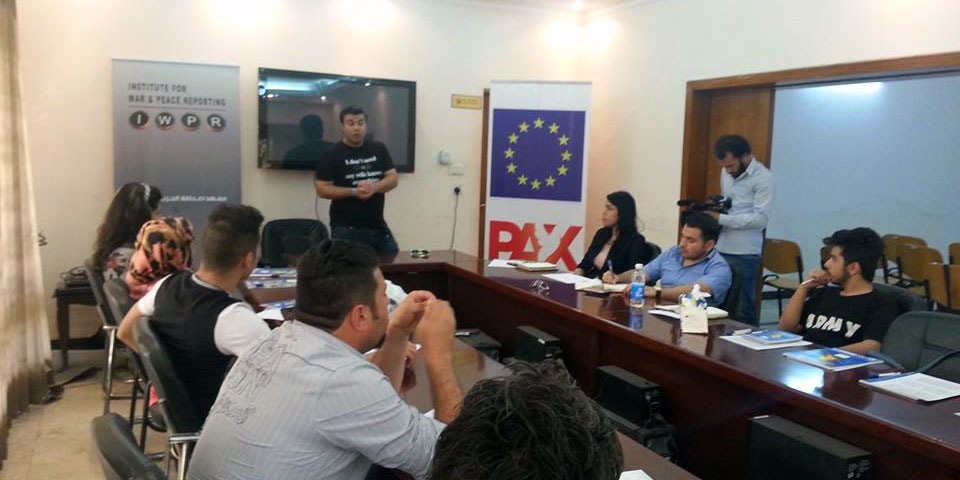PAX in Iraq

PAX has been working in Iraq since 2002. We support organisations that contribute to building a new, democratic Iraq. Starting from a peace-building perspective, we work to strengthen relations between citizens (horizontal) and between citizens, government and government bodies (vertical). PAX promotes a citizenship approach in response to the increasing sectarian context in which national developments are framed. Current programs focus on freedom of religion, religious diversity, minority rights and the role of women in local governance. PAX is working with several Iraqi partners on these topics and mainly in support for dialogue between the various communities in Iraq. Despite the volatile context of Iraq during recent years, many programs have been ongoing and PAX has been able to built a resilient network of peace activists in the country.
Freedom From Fear Alliance (all Iraq Governorates)
As part of the Freedom From Fear Alliance (in joint coordination with Amnesty International, Free Press Unlimited and Global Partnership for the Prevention of Armed Conflict), PAX is supported by the Netherlands Ministry of Foreign Affairs to support various peace building programs in Iraq. This component includes local governance programming in Bagdad and Basra, but also international lobby and advocacy activities in EU and UN context.
Depleted uranium
PAX is also working on depleted uranium in Iraq. After the 1991 Gulf War, reports circulated that said depleted uranium was responsible for many health problems among veterans and Iraqi civilians. Since then, depleted uranium has been the subject of a heated international discussion. Recent research shows that depleted uranium can, indeed, harm people and the environment. It is vitally important for everyone to know about its potential consequences. PAX believes that with a prohibition, the Netherlands supports the international call for transparency and offers this transparency to its own military personnel.
Kulluna Muwatinun (all Iraq Governorates)
One program in particular, called Kulluna Muwatinun, we are all citizens, has grown significantly in recent years. Kullina Muwatinin is a program developed by PAX and its partners in Iraq and Syria to promote citizenship and prevent sectarian tensions and violence in Iraq and Syria. Like several European countries, the Netherlands regards ‘freedom of religion and belief’ as one of the key issues in its human rights policy. From the side of PAX and its partners in Iraq and Syria, it has been stressed that a policy that singles out religious minorities, in particular Christians, might be counter-productive. In stead we have proposed a policy that focuses on citizenship and respect for diversity as the best approach. The program is funded by the Ministry of Foreign Affairs in the Netherlands and runs from 2012 to 2015. An extension of the program in Iraq is funded by the European Union and runs from 2013 to 2016. PAX is also supporting local initiatives to study root causes for conflict and documentation of human rights violations. More information can be found through the Kulluna Muwatinun link.
Women and youth against violence (Kirkuk, Basra)
PAX is participating in a 1325 program funded by the Netherlands Ministry of Foreign Affairs aiming to establish an effective partnership between Dutch NGOs, Iraqi, Libyan, Syrian and Palestinian NGO’s in order to strengthen (young) women leadership and women’s security in Iraq, Occupied Palestinian Territories and Syria. The project focuses on improving human security of women to 1) enhancing local women networks in participatory monitoring of security and advocating a gender sensitive approach to security in Iraq, Syria and Occupied Palestinian Territories 2) to contribute to the capacity and willingness of local authorities (including political, religious and traditional leaders) and security stakeholders to address gender-specific concerns and assure that interfaces with women networks are established in Iraq, Syria and Occupied Palestinian Territories. 5) to exchange good practices between the country groups on their strategies improving the security of women and engagement with security stakeholders at the local, national and international level 6) to achieve more receptiveness from key players within the UN, EU and NATO to take the perspective and priorities of local women and their communities into account whilst setting the peace and security agenda for Iraq, Syria and Occupied Palestinian Territories.

